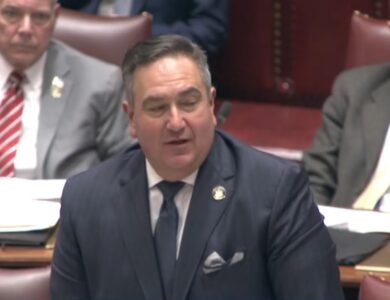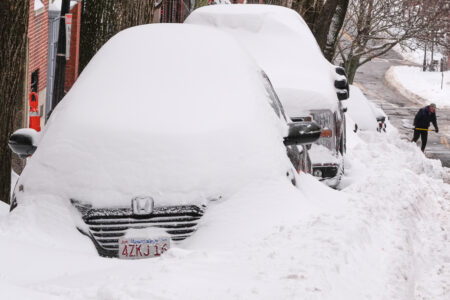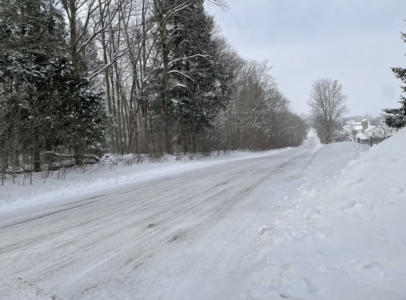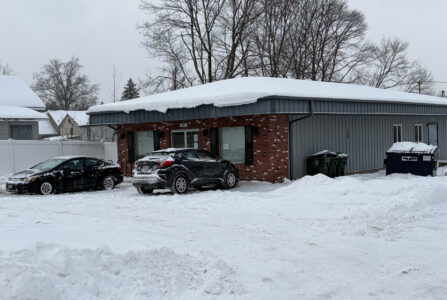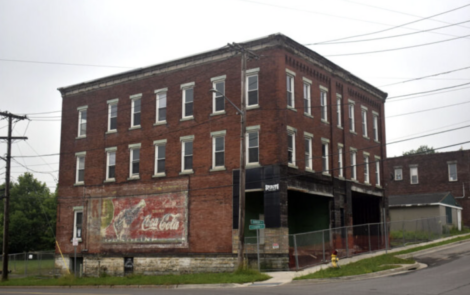JPS Teacher Collects Stories Of COVID’s Front Lines
In Their Own Words

Michael Tuccio, Fredonia resident and Jamestown Public Schools teacher, worked for a month to collect stories of health care workers who have been serving on the front lines of the COVID-19 pandemic. P-J photo by Natasha Matteliano
Michael Tuccio likes to stay active.
Between his work as a teacher in the Jamestown Public Schools district and constantly supporting his kids in their various activities, the Fredonia resident is rarely dormant — an attribute that posed a challenge in the wake of a statewide shutdown and quarantine as a result of the outbreak of COVID-19.
“By about the third day, I said, ‘I need something to do. I’m going to need a project,'” Tuccio, who has spent two decades in education as a history teacher and will begin working at the district’s Raymond J. Fashano Technical Academy in the fall, said.
That project began as a letter-writing campaign to health care workers — of which he had several former students working as.
But in reconnecting with these former students, Tuccio got to thinking about how this recognition for those working on the front-lines of this pandemic could continue.

Michael Tuccio works at his computer to edit and compile the stories of health care professionals who are working amid COVID-19. Submitted photo
“I said to each them, ‘When this is over, I’d like to sit down with you and talk to you about what you’ve experienced,'” he said, not realizing the pandemic would continue as long as it has.
“So, I started thinking about who might be interested in talking and sometimes just throwing it out online is just the easiest and I wanted to put the feeler out as to who wanted to talk to me,” he added.
The reaction to Tuccio’s May 25 post asking to hear from health care workers became overwhelming.
“That post started getting shared 75 or 80 times and I started getting messages from former students, from friends and then I started getting messages from people I didn’t know,” he said. “The response was just …. amazing.”
The final product, posted on July 3, was a 34-page document with testimonials from 30 health care professionals from across the United States — a document capturing one of the most unprecedented periods in American history at the local level.
“This is our Great Depression, this is our World War II, this is our great, historical event,” Tuccio said. “We’re all in it and I think the healthcare workers are where it’s not about politics, it’s not about their own feelings toward anything — they don’t have a choice. They have to take care of the people in front of them.”
Debating on whether or not to interview each subject over the phone or via email, Tuccio eventually sent our questions to each person who expressed interest in being part of the project.
“It worked out very well because most of the people wanted to write because they knew it would take time,” he said. “Some people really wanted to think about it.”
By the time the content was all received, Tuccio said the results were awe-inspiring, coming from a variety of different backgrounds with a variety of different insights. Some chose to use their name while others remained anonymous.
“There are seven or eight kids that are former students of mine,” he said. “There’s a pride factor in that … But there are two or three stories of people who worked directly with COVID patients that passed away. There were a couple of them who were with COVID patients that were very, very sick and thought someone was going to die and made it. Those are the ones that impacted me the most. That’s the stuff that makes it real.”
One former student — Alicia who works at Lake Erie Medical Services — told the story of how working amid the pandemic showed her how difficult the food supply chain is.
“It made me realize that I can not be dependent on major corporations to supply me with everyday goods,” she wrote. “I want to be able to prepare meals from scratch, even growing my own food, learning how to be more self-sufficient. I realize that I need to broaden my knowledge to make sure my daughter is able to have the things she needs. Whether that’s learning how to make soaps, or learning about different herbs to help heal wounds. This has put the world in perspective for me.”
She also shared the small victories that continued to give her hope.
“I was able to sit through a sonogram and tell a mother that has been trying to get pregnant for months that she was having twins,” she wrote. “I was able to point out the heartbeats to her.”
They also shared their struggles: another former student, Emily DePane, who works for Aftercare Nursing Services, told Tuccio about the struggles of trying to explain the restrictions put in place by the pandemic with patients with developmental disabilities.
“The fact that there are things and situations they do not understand … It frustrates them,” she said. “You can see and feel it, but we are trying to do whatever we can to turn it into a positive situation. This is the hardest, especially when they are to the point of being in overdrive and beyond upset. We have to explain to them why their family can not come see them.”
Others — mostly those from outside the Chautauqua County area — talked about seeing devastating impacts of the virus up close.
Kaitlyn Weckerle, who works in New York City, connected with Tuccio through a mutual friend and told him of caring for an elderly couple who both tested positive for the virus.
“The husband came in first, initially refusing intubation, intending to beat the virus on his own,” she said. “Given his age and body’s inability to fight without assistance, he eventually took a turn for the worse and was intubated. His rapid worsening and immediate requirement for intubation happened to coincide with his wife’s admission to the hospital in a particularly bad state as a result of COVID-19.”
“Given her critical state upon admission and his then-critical state upon her being admitted, neither of them ever knew they were Mather hospital patients at the same time or that the other had been intubated,” she wrote. “Both eventually passed away, again, neither of them knowing of the other’s passing. Their daughters were in contact with staff regularly throughout the day … This was probably the hardest thing to witness, especially being so involved in their final moments while neither of them could do so for the other, despite having spent a lifetime together.”
And while this period has certainly brought about challenges, most have never wavered in their dedication to their work.
“Nothing in health care is easy, but this pandemic has made it so hard for the people who really don’t understand what is going on,” DePane wrote. “It makes it hard to work with them daily without breaking down. I think of my clients as family. It is upsetting, frustrating, straining, and exhausting. At the same time, never would I give up my life or my job. My job is my life and my client is my profession.”
And each are confident in that profession’s ability to get through these challenges.
“People don’t understand that this virus is new to us, just like it’s new for the country,” Weckerle said. “When there’s something new in science, years of research is needed and research gives us only some answers initially.”
And, to Tuccio — who hopes to continue to collect stories for a similar project in the fall — they are nothing short of heroes.
“These people deserve the respect of a solder that is being sent away to war,” he said. “It doesn’t matter in that moment why they’re there — they don’t get a choice on that and we owe these people our gratitude and our respect because they didn’t get a choice. This is the job they’ve done and they get up every day and do it.
“I just wanted to show some appreciation for these people doing the work.”
To read Tuccio’s full report, visit: http://ow.ly/YSlg50As1p4
- Michael Tuccio, Fredonia resident and Jamestown Public Schools teacher, worked for a month to collect stories of health care workers who have been serving on the front lines of the COVID-19 pandemic. P-J photo by Natasha Matteliano
- Michael Tuccio works at his computer to edit and compile the stories of health care professionals who are working amid COVID-19. Submitted photo



